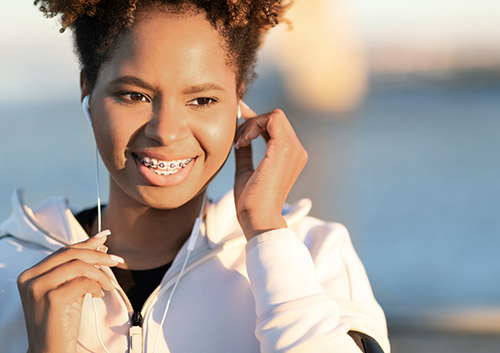Holiday Gift Ideas for Healthy Holiday Smiles
December 3rd, 2025

Need some gift ideas for family members and friends who seem to have absolutely everything? Who are impossible to shop for? Who tell you not to worry, it’s the thought that counts? Well, we have a few suggestions to show your loved ones that you’ve put a lot of thought into their gifts this holiday season.
You love to see your friends and family smile, so we’ve come up with some smile-worthy ideas curated to their specific interests. And they’re braces-friendly, too!
Environmental Ally
The world is becoming a more eco-conscious place, and happily this transformation includes products designed for personal care. Put together a spa basket which is good for your friend’s dental health and the planet!
A recyclable gift box containing zero-waste, environmentally friendly bath products and organic cotton face cloths becomes even more mindful with the addition of bamboo or recycled plastic toothbrushes, bamboo interdental picks, and biodegradable floss.
Don’t forget to include a colorful, insulated water bottle for sustainable hydration—and washing away food particles when there’s no handy place to brush after eating. Healthy planet/healthy smile.
Talented Techie
If your friend or relative is high-tech all the way, maybe it’s time for a dental upgrade.
Water flossers are a great way to eliminate stubborn plaque around brackets and behind wires. Adjustable water pressure applies just the right amount of cleaning power. The flow can be directed to the gumline, between teeth, around brackets, or anywhere else needed. Some models even offer tapered heads with brushes designed specifically for cleaning braces.
And for an extra thoughtful touch, include a packet of plaque disclosing tablets. Chewing one of these helpful little tablets will reveal any plaque that’s still on the teeth.
Adventure Seeker
How about a new backpack or carry-all for outdoor or travel adventures? A travel first aid kit is always a welcome addition for the person on the go.
Go the extra step and help a friend be prepared for anything with an emergency dental kit designed for braces. You can find these lightweight kits in stores or online, or you can assemble one yourself with a travel-size orthodontic toothbrush and toothpaste, floss threaders and floss, interproximal brushes, a travel mirror, and, of course, orthodontic wax in a handy kit bag. Include a pack of sugar-free gum—it helps with altitude changes and hydration. Ask Dr. Karen Seder or the team at Seder Orthodontics for suggestions!
Film Buff
If your bestie likes nothing better than an evening spent in front of the home screen, consider a subscription or gift card for a streaming service tailored to his or her favorites, whether it’s classic films, sci-fi, action, rom-coms, or epic adventures.
And don’t forget the binge-watch treats! Fill a basket with braces-friendly goodies like peanut butter cups, junior mints, soft chocolate truffles, and some sparkling water. Maybe add a gift card for healthy smoothies and ice cream. Who needs popcorn and sodas?
No matter who’s on your shopping list, tailoring your gifts to their interests and their well-being is a great way to share happy, healthy holiday smiles with family and friends in Chicago, IL.




 Website Powered by Sesame 24-7™
Website Powered by Sesame 24-7™